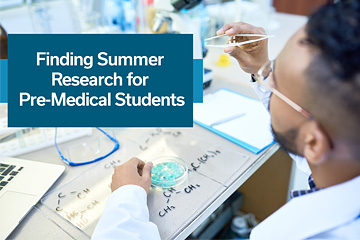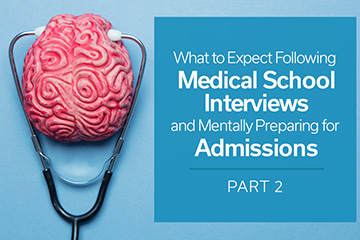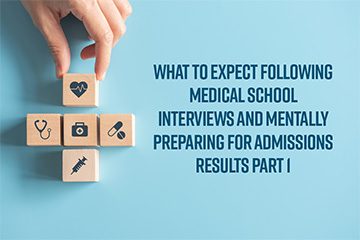
Should I do grad school before med school?
Congratulations to everyone who has received admission offers to med school! For those who are still waiting to hear back, or are rejected, a big question to consider is “should I do grad school before med school?” In this article, we will discuss how graduate school experience can benefit one’s medical school education and the career beyond.
——————
There are many educational routes that can lead aspiring physicians to their career of choice. In a knowledge economy, medical schools benefit from the educational diversity and breadth of experience within their student cohorts. Graduate students in particular share the asset of having developed highly desirable research and critical thinking skills, which are often viewed favorably in the competitive world of academic medicine. Inarguably, the expertise, professionalism and maturity of post-graduate applicants are coveted traits. Students who enter their medical studies with a Master of Science or PhD will finds their acquired skills to be easily transferrable in an environment where fast-paced, independent learning is crucial for success. Whether the ultimate career goal is to become a rural family physician or a sub-specialized clinician at a tertiary care centre, entering medical school with a graduate degree in science offers an abundance of advantages for aspiring physicians. Here we present a select few highlights:
1. Appraisal of evidence
Modern medicine is based on evidence, past and present. Medical school curricula are designed around the most fundamental principles in across various specialties, provided in discreet packages or units for the benefit of the learner. Inherently the information delivered to medical students is the most distilled version of years of research. The further along a medical student is in their studies, however, the more integral it will be to read and understand more recent medical literature. In their clinical years, students will be exposed to rounds and journal clubs, where important discussions will be based around recent landmark publications and clinical trials.
An experienced graduate student will know that not all published studies are equivalent and the importance of noting different levels of evidence and quality of study methods. Graduate students in the sciences have spent significant amounts of time appraising literature effectively, formulating critiques and most importantly, summarizing the findings into the most important, validated points. Research methodology and statistical analysis may also be of more familiar ground. Overall, the learning curve for assessing the validity and relevance of a medical research article will be shorter, if not already completed all together.
It is also important to recognize the value of effective literature appraisal after completing medical school. Residents are encouraged to maintain a good understanding of landmark trials in their chosen field and commonly analyze smaller studies for their practical relevance. The working physician too will have to maintain their credentials continuously by reviewing new literature and applying updated guidelines and protocols in their practice.
2. Conducting research
Medical students are encouraged to seek research opportunities of their interest in parallel to their studies. The goal of students and their respective supervisors is to conduct high-quality research that will impact their specialty through conference presentations and publications. In addition to acquiring research skills and proficiency in their field of study, leading a successful research project can be a great advantage for the residency match and beyond. Indeed, there is no reason to not do research during medical school!
Designing a novel research project is an exciting challenge, but it also requires careful planning and foresight. Graduate students can shine through their acquired experience, which they can apply in developing novel research questions, methods and strong data analysis techniques. By conducting previous Masters or PhD projects, students may have experiences with common critiques in research methodology and analysis. These are skills that cannot be overemphasized, when time is often scarce and expectations are high in medical schools. Graduate students often also have a good network of colleagues and mentors for peer feedback on their research study. However, one of the most valuable assets is independence in approaching and carrying out projects from start to finish.
3. Writing and publishing
An essential component of postgraduate training in the sciences is the completion of a thesis and, in most cases, the submission of original manuscripts for publication. Writing a comprehensive thesis can take weeks to months, as a manuscript goes through a lifecycle of serial reviews and edits by colleagues and supervisors. This allows graduate students to develop refined scientific writing skills in order to become proficient at translating research findings into comprehensive and clear written concepts. Graduate students are also apt at applying principles of ethical publication practices, including literature citing and referencing, which has become increasingly important in a dense medical publication milieu.
These are transferable skills in medical school, as many students will attempt to publish a research study or participate in a form of medical writing and editing for a student publication. There is a variety of opportunities for this across medical school in Canada and beyond, and students can seek involvement based on their interest in medical publishing across student-run publications. For example, the University of Toronto Medical Journal (UTMJ) and the University of British Columbia Medical Journal (UBCMJ) accept original manuscripts and review pieces from medical students across the country. Medical student-produced textbooks such as Toronto Notes (Toronto Notes for Medical Students Inc.) have also garnered tremendous success over the past ten years in engaging medical students to become involved in writing and editing for peers and across disciplines.
Medical students’ opinions on educational and medico-social issues are highly valued within and outside of the ivory towers of medical schools. Opinion pieces, commentaries and position papers are increasingly used by medical students as a vessel for communication with the public and medical professionals on active issues related to medical education and practice. Articulating arguments with the backing of clear evidence will allow medical student writers to engage readers in critical thinking and dialogue for reform.
Check out our blog on how the second time applying to medical school could be the charm!
For more FREE Resources:
Interview Prep Videos
Application Prep Video






